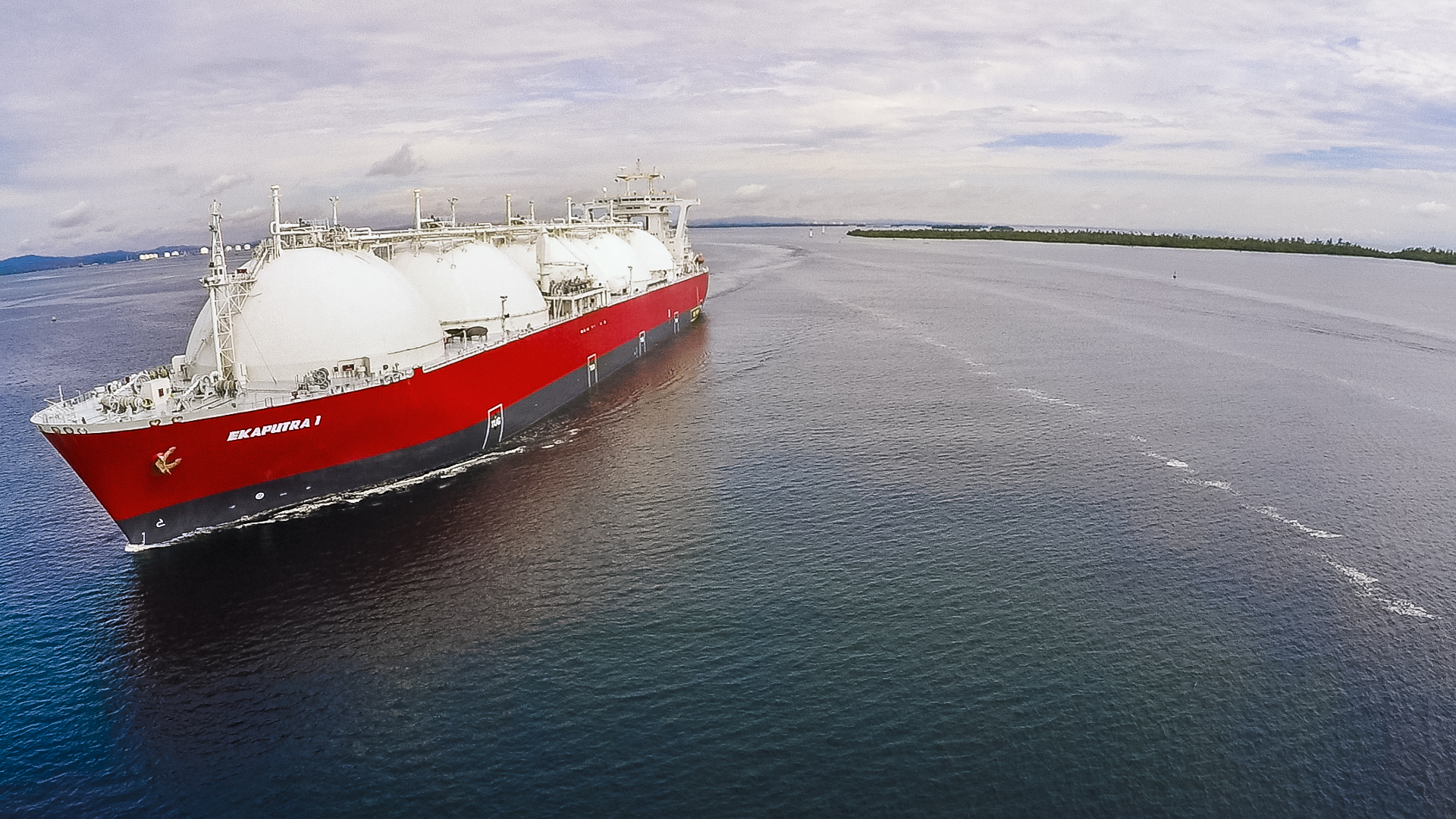(TheIndoDaily) – The Asian liquefied natural gas (LNG) prices fell this week, driven by softer downstream demand. The fall is expected to prompt buying opportunities for some Asian importers, analysts say.
“Asian LNG prices fell this week, prompting opportunistic buying from some Asian importers. The drop was driven by softer downstream demand, though supply disruptions in Australia and Brunei slowed further drops in prices,” Masanori Odaka, a senior analyst with Rystad Energy, said in a market update on Tuesday (16/04).
“While some Asian importers moved quickly to lock in lower prices, others remained cautious amid market uncertainty, partly fueled by renewed concerns over trade tensions, as well as comfortable storage levels,” he said.
Asian LNG prices for May settled at approximately $12.5 per MMBtu, down 8.7% from April 2025 but 29% higher than in May 2024.
While, LNG derivatives prices for June fell 2% week-on-week on 15 April to $11.4 per million British thermal unit (MMBtu), while Dutch Title Transfer Facility (TTF) June prices dropped 2.4% to $11.4 per MMBtu, Rystad Energy said in a note.
Asian Importers
Rystad said some importers, such as Korea Gas Corporation (Kogas), a Chinese importer unaffiliated with a national oil company, and CPC Corporation, bought May-June cargoes at or below $11 per MMBtu.
Kogas is also seeking additional volume for June 2025-March 2026 delivery, it said.
The gas research agency added Bangladesh’s Rupantarita Prakritik Gas Company Ltd (RPGCL) bought cargoes for 15-16 May and 25-26 May delivery, while India’s Gujarat State Petroleum Corporation (GSPC) was seeking a cargo for 10-31 May delivery.
In terms of regional supply disruptions, Brunei LNG, operated by a joint venture between the Brunei government, UK supermajor Shell, and Japan’s Mitsubishi, experienced an outage on 11 April.
Meanwhile, the Inpex-operated Ichthys LNG project in Australia also faces disruptions, with loading schedules for multiple cargoes delayed by one day. Inpex is currently seeking a replacement cargo for 17 May delivery, with offers due by 16 April, Rystad added.
“Mild weather forecasts in the shoulder-month period will likely limit gas consumption in East Asian countries for the remainder of April,” Odaka said.
As for Japan, power prices in Japan for 17 April have fallen by about 40% week-on-week.
Japan has significant planned maintenance scheduled for all fuel types, reducing available capacity by 18% for April and 15% for May compared to March 2025, he said.
By Staff Writer


Prices for Asian LNG fell this week, prompting opportunistic buying from some importers. The drop was driven by softer demand, though supply disruptions in Australia and Brunei slowed further declines, said Masanori Odaka, a senior analyst with Rystad Energy.
Some Asian importers moved quickly to lock in lower prices, while others remained cautious amid market uncertainty, partly fueled by renewed trade tensions, as well as comfortable storage levels, Odaka said.
Asian LNG prices for May settled at approximately $12.5 per MMBtu, down 8.7% from April 2025 but 29% higher than in May 2024. LNG derivatives prices for June fell 2% week-on-week on 15 April to $11.4 per MMBtu, while Dutch TTF prices dropped 2.4% to $11.4 per MMBtu, Rystad said.
Some importers, such as Kogas, a Chinese importer unaffiliated with a national oil company, and CPC Corporation, bought May-June cargoes at or below $11 per MMBtu.
In terms of regional supply disruptions, Brunei LNG had an outage on 11 April. The Ichthys LNG project in Australia also faced disruptions, with loading schedules for multiple cargoes delayed by one day. Inpex is currently seeking a replacement cargo for 17 May delivery, with offers due by 16 April, Rystad added.
Mild weather forecasts in the shoulder-month period will likely limit gas consumption in East Asian countries for the remainder of April, Odaka said.
As for Japan, power prices in Japan for 17 April have fallen by about 40% week-on-week. Japan has significant maintenance scheduled for all fuel types, reducing available capacity by 18% for April and 15% for April compared to March 2025, ODAKA stated.
Interesting analysis of the current LNG market dynamics. The drop in prices seems to be a double-edged sword—beneficial for some importers but causing hesitation for others due to market uncertainties. It’s intriguing how supply disruptions in Australia and Brunei are playing a role in stabilizing prices despite softer demand. The opportunistic buying by companies like Kogas and CPC Corporation highlights the strategic moves in this volatile market. The mild weather forecasts and reduced power prices in Japan add another layer of complexity to the situation. Do you think these price fluctuations will lead to a long-term shift in LNG trading strategies? Also, how might the ongoing trade tensions further impact the market? Would love to hear your thoughts!
This is an interesting analysis of the LNG market dynamics in Asia. The price fluctuations seem to be driven by a mix of demand, supply disruptions, and geopolitical factors. The opportunistic buying by some importers reflects a strategic move to capitalize on lower prices, while others remain cautious due to market uncertainties. The disruptions in Brunei and Australia highlight the vulnerability of supply chains in the region. It’s intriguing to see how weather forecasts and maintenance schedules further influence the market. Regarding Japan, the significant drop in power prices raises questions about the long-term impact on its energy sector. Do you think the current price trends will encourage more investment in LNG infrastructure in the region, or will the volatility deter potential investors?
The recent drop in Asian LNG prices is quite intriguing, especially with the opportunistic buying by some importers. It seems like a strategic move for those who acted quickly, but I wonder how sustainable these lower prices will be in the long run. The market uncertainty, fueled by trade tensions, adds another layer of complexity that might make others hesitant. It’s interesting to see how regional disruptions in Brunei and Australia are impacting the overall supply chain. Do you think these disruptions will have a lasting effect on prices, or will the market stabilize soon? The mild weather forecasts might help balance demand, but I’m curious about the broader implications for East Asian countries. Also, do you believe the planned maintenance in Japan will significantly impact the overall LNG market?
We’ve integrated libersave into our regional voucher system. It’s fantastic how it simplifies bundling various providers on a single platform.
It’s interesting to see how Asian LNG prices are fluctuating due to a mix of demand and supply factors. The opportunistic buying by some importers while others remain cautious shows the complexity of the market. The disruptions in Brunei and Australia seem to be playing a significant role in stabilizing prices, but the mild weather forecasts might further impact demand. It’s also noteworthy how Japan’s power prices are dropping significantly, likely influenced by planned maintenance. Do you think the current price levels will encourage more long-term contracts, or will importers continue to wait for further drops? The market dynamics seem quite unpredictable, and it’s hard to say what the next major shift will be. Also, how do you see the trade tensions influencing LNG trade in the coming months?
We’ve integrated libersave into our regional voucher system. It’s amazing how easily it allows us to bundle various providers on a single platform. Whith regards, EUFOR
The website design looks great—clean, user-friendly, and visually appealing! It definitely has the potential to attract more visitors. Maybe adding even more engaging content (like interactive posts, videos, or expert insights) could take it to the next level. Keep up the good work! Whith regards, OVERP
The recent drop in Asian LNG prices seems like a good opportunity for importers to secure cheaper energy, but it’s interesting how market uncertainty is keeping some cautious. It’s clear that supply disruptions in Australia and Brunei are playing a role in stabilizing prices despite softer demand. I wonder how long these disruptions will last and if they will significantly impact global LNG supply. It’s also worth noting that storage levels seem comfortable, which might ease some pressure on prices in the short term. What do you think about the trade tension concerns influencing the market? Could this be a turning point for LNG pricing trends? Overall, the situation seems complex, with multiple factors at play, but it’s fascinating to see how importers are navigating this volatility.
Wir haben libersave in unser regionales Gutscheinsystem eingebunden. Es ist toll, wie einfach man verschiedene Anbieter auf einer Plattform bündeln kann. Whith regards, EURCA